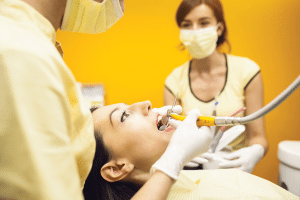If you own a dental practice, you probably know that you’re subject to various taxes that can significantly impact your financial health. While the tax burden for dentists varies depending on factors such as location, business structure, and revenue, these professionals often face considerable tax obligations. But we’re here to bring you good news about this situation: Currently, there are multiple strategies and opportunities to minimize your tax liabilities and improve your practice’s financial prosperity.
As the tax season deadline approaches, it’s the perfect time to consider how an IRA can benefit your business and contribute to your savings. For that reason, we gathered our team of Dental CPAs to equip you with all the essential information before the upcoming deadline on April 15, 2024. So, let’s get started on this comprehensive guide and discover important tax tips for dentists.
IRAs for Young Adults
One of the most effective ways to save on taxes is by contributing to Individual Retirement Accounts (IRAs). For young adults in the dental field, IRAs present a golden opportunity to secure their financial future while minimizing tax liabilities. Traditional and Roth IRAs offer distinct advantages, from tax-deductible contributions to tax-free withdrawals in retirement. By understanding the nuances of each option and considering factors such as income limits, tax brackets, and long-term financial goals, dental professionals can make strategic IRA contributions to optimize tax savings.
Both traditional and Roth IRAs offer unique benefits, so the choice between them largely depends on your long-term financial goals and retirement plans. In the 2023 tax year, you have the opportunity to contribute a maximum of $6,500 or your earned income for the year, whichever amount is lower. The good news is that this limit will increase to $7,000 for the 2024 tax year.
Traditional IRAs can be a great option if you want immediate tax relief through tax-deductible contributions. Just keep in mind that the deductibility of contributions may phase out based on your income and whether you have a retirement plan through work. It’s also important to remember that withdrawals from traditional IRAs are taxable, and penalties may apply for early withdrawals.
On the other hand, Roth IRAs offer tax-free growth and tax-free withdrawals when you retire. Even though the contributions aren’t tax-deductible, the benefit of tax-free withdrawals during retirement can be super valuable, especially if you think you’ll be in a higher tax bracket. Another amazing aspect of Roth IRAs is that they give you more flexibility when it comes to planning for retirement because you don’t have to worry about minimum distributions during your lifetime.
Essential Factors to Consider
- Income limits and phaseouts: Keep in mind there are income-based phaseout ranges that might impact your ability to contribute to Roth IRAs or deduct traditional IRA contributions.
- Tax bracket considerations: Your tax brackets are definitely something to consider when choosing between traditional and Roth IRAs. If you think you’ll be in a higher tax bracket in the future, the Roth IRA could be a great option for you
- Flexibility and future planning: Roth IRAs are a fantastic investment option because they offer great flexibility. You can withdraw your contributions without having to worry about taxes or penalties. Besides, another great benefit is that your heirs can also enjoy the benefits of your Roth IRA.
Remember, starting your IRA contributions at a young age can have a huge impact on your retirement savings. Even small annual contributions can grow greatly over time due to the power of compounding.
Tax Credits for Sick and Family Leave
Another valuable tax credit many self-employed dental professionals overlook is for sick and family leave, missing out on some potential savings. By filing amended tax returns and claiming these credits, individuals have the potential to receive up to $32,220 in tax savings. The eligibility criteria cover various scenarios related to COVID-19, such as quarantine orders, illness, caregiving responsibilities, and vaccination-related absences.
To determine if you are eligible for the credits, assess if you were unable to work or provide services at any point between April 1, 2021, and September 30, 2021, for any reason, including:
- You were subject to a federal, state, or local quarantine or isolation order related to COVID-19.
- A healthcare provider advised you to self-quarantine due to concerns related to COVID-19.
- You were experiencing symptoms of COVID-19 and seeking a medical diagnosis of COVID-19.
- You were seeking or awaiting the results of a diagnostic test for, or a medical diagnosis of, COVID-19.
- You were exposed to COVID-19 or could not work pending the results of a test or diagnosis.
- You received a COVID-19 vaccination.
- You were recovering from any injury, disability, illness, or condition related to such immunization.
- You took care of someone under a COVID-19 quarantine order.
- You were caring for your son or daughter because the school or place of care for that child was closed, or because the childcare provider for that child was unavailable, due to COVID-19 precautions.
- You accompanied someone to get a COVID-19 vaccine.
- You were caring for an individual recovering from any injury, disability, illness, or condition related to the immunization.
If you answered “yes” to any of these questions, you are eligible for valuable tax credits. Depending on the number of qualifying days and your income, you could potentially receive tax credits totaling up to $32,220. This is an opportunity that you won’t want to miss out on.
Although taxes can be challenging for dental practice owners, there are many opportunities to reduce liabilities and improve financial well-being. By planning ahead and seeking expert advice, dealing with tax complexities can become easier.
Expert Guidance for Tax Season
As the end of tax season approaches and the deadline looms, it’s essential to consider your deduction strategy. We’re here to help dentists with personalized guidance and support, so they can make informed decisions that align with their practice’s goals. Don’t let tax season pass you by without maximizing your savings. Reach out to us today, and let’s secure your financial future.




